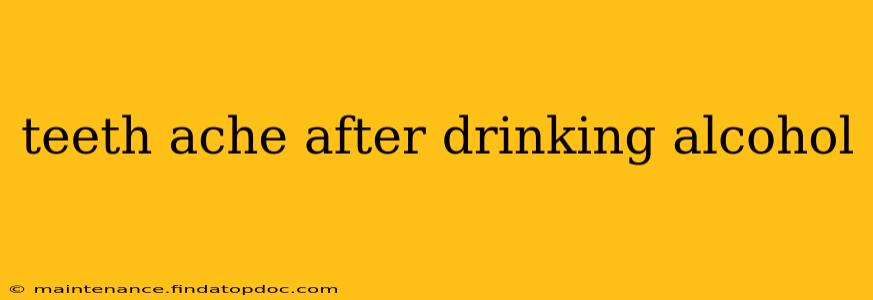Many people experience a throbbing toothache after consuming alcohol. This isn't a myth; it's a surprisingly common occurrence with several potential causes. Understanding why this happens can help you manage the pain and prevent future episodes. This comprehensive guide delves into the reasons behind alcohol-induced toothaches, effective remedies, and preventive measures.
Why Does My Tooth Hurt After Drinking Alcohol?
The connection between alcohol consumption and toothaches isn't always straightforward, but several factors can contribute:
-
Increased Sensitivity: Alcohol, especially cold or carbonated alcoholic beverages, can exacerbate existing tooth sensitivity. If you already have cavities, exposed dentin (the layer beneath enamel), or gum recession, the alcohol can irritate these areas, leading to pain. The cold temperature further intensifies the sensitivity.
-
Dehydration: Alcohol is a diuretic, meaning it increases urination and can lead to dehydration. Saliva plays a crucial role in neutralizing acids in the mouth and protecting teeth. Dehydration reduces saliva production, leaving your teeth more vulnerable to acid attacks from the alcohol itself and from bacteria. This can worsen existing problems or even trigger new ones.
-
Acidic Content: Many alcoholic beverages are acidic, particularly wines and some cocktails. This acidity erodes tooth enamel over time, making teeth more susceptible to pain and decay. The immediate effect of this acidity can be a sharp, temporary toothache.
-
Sugar Content: Many alcoholic drinks contain significant amounts of sugar. Sugar feeds bacteria in the mouth, leading to increased acid production that attacks tooth enamel and causes cavities. This, in turn, can result in a toothache.
-
Existing Dental Issues: Pre-existing dental problems like cavities, gum disease, cracked teeth, or poorly fitted dental work are significantly more likely to cause pain when exposed to the irritants in alcohol. Alcohol can exacerbate these underlying issues.
What Can I Do to Relieve a Toothache After Drinking Alcohol?
If you're experiencing a toothache after drinking, here are some steps you can take to alleviate the pain:
-
Rinse Your Mouth: Rinse your mouth thoroughly with lukewarm water to remove any lingering alcohol and food particles. You can also use a fluoride mouthwash to help remineralize your teeth.
-
Over-the-Counter Pain Relief: Nonsteroidal anti-inflammatory drugs (NSAIDs) like ibuprofen can help reduce pain and inflammation. Follow the dosage instructions carefully.
-
Cold Compress: Applying a cold compress to the affected area can help numb the pain and reduce inflammation.
-
Avoid Irritants: Steer clear of acidic foods, sugary drinks, and hot or cold temperatures that can further irritate your teeth.
-
Hydration: Drink plenty of water to rehydrate and stimulate saliva production.
How Can I Prevent a Toothache After Drinking Alcohol?
Prevention is key to avoiding alcohol-induced toothaches. Here's how you can protect your teeth:
-
Limit Alcohol Consumption: Moderation is crucial. The less alcohol you consume, the less your teeth are exposed to its harmful effects.
-
Choose Less Acidic Drinks: Opt for lower-acidity alcoholic beverages when possible.
-
Brush and Floss Regularly: Maintain excellent oral hygiene. Brush your teeth twice a day and floss daily to remove food particles and plaque.
-
Regular Dental Checkups: Schedule regular checkups and cleanings with your dentist. Early detection and treatment of dental problems can prevent more severe issues and toothaches.
-
Drink Water Between Alcoholic Drinks: Diluting the alcohol with water can help minimize its impact on your teeth.
Does Alcohol Cause Tooth Decay?
Yes, alcohol consumption can contribute to tooth decay. The acidic nature of many alcoholic beverages erodes enamel, and the sugar content feeds bacteria, leading to acid production and cavities. Dehydration from alcohol further compounds this problem.
Can Drinking Alcohol Make Existing Tooth Problems Worse?
Absolutely. Alcohol can exacerbate existing dental problems like cavities, gum disease, and sensitive teeth. The irritating effects of alcohol can significantly worsen discomfort and pain related to these issues.
What Should I Do If My Toothache Persists After Drinking Alcohol?
If your toothache persists or worsens after trying home remedies, seek professional help immediately. A dentist can diagnose the underlying cause and provide appropriate treatment. Ignoring a persistent toothache can lead to more serious dental complications.
This information is for general knowledge and does not constitute medical advice. Always consult a dentist or other qualified healthcare professional for any dental concerns.
